originally posted at https://canmom.tumblr.com/post/162554...
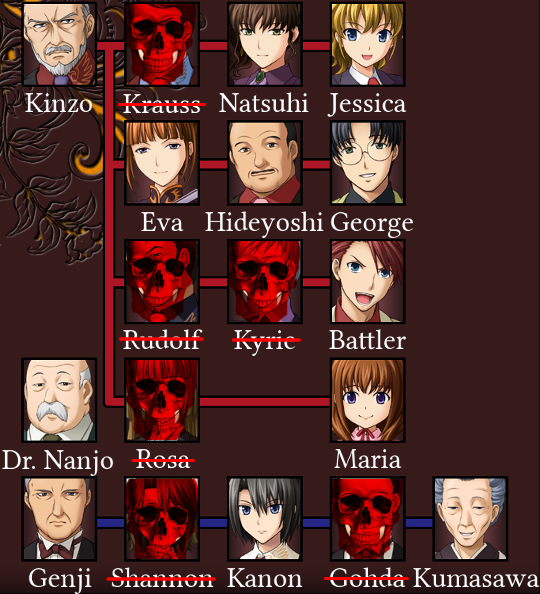
We have murders, we have mystery, we have magic (or not…). And we have a gun. What next?
Well, next we have comments.
Comments
My friend had a few things to add about Japan inspired by recent posts:
on commuting to school on the train:
train transport is very very very cheap in Japan and the most common way to commute. Unless one lives right next to school (and can thus walk) most children start taking the trains as early as jr high school (grades 7-9, ages 13-15)
Train commute is even common in suburban and rural areas, if ones destination is outside of said areas. A day trip to the beach would likely be taken by train, unless it was a big party
In the suburbs, it’s actually more common not to own a car – bikes are more prevalent which is why you see gradeschoolers walking to school by themselves/with a buddy
people with cars in suburban areas tend to have a reason to need them, unlike in the west where it’s unthinkable not to have one. even a lot of white collar people take the train over using a car.
culturally speaking too, japan is very environment friendly, and is one of the cleanest places in the world – while there are some incentives to “being green” as we’d say in the west
mostly it’s just done because That’s How it Is
I’m not saying no one drives / has personal transport, far from it! But trains are definitely super common, even for super rich people (though the fantasy is more about personal drivers, like everywhere else in the world)
on the river in the riddle:
a lot of japanese mythology and folklore centre around rivers and other moving bodies of water. i am not certain that this one is referencing any specific legends (it doesn’t ring any bells for me) but the use of rivers is not uncommon
on the situation
“They are completely isolated” ^closed circuit mysteries seem to be very popular in japan, In but really sure why
@red-zora also had some comments:
Maria is almost certainly coded as autistic FYI - without giving any spoilers it ties in a lot with the themes Ryuukishi is discussing
the riddle is actually solvable, but…. it is very, very difficult. i will tell you that all the information you need to solve the riddle is given in the first 4 Episodes if you do wanna tak e acrack at it XD
tho it requires a bit of analysis of the original japanese text of the epitaph, e.g. Golden Land = Ougon Kyou vs Village of Gold = Ougon no Kyou etc
Thanks for the info, I’ll take a shot at that when I get to the end of ep. 4. At the current rate of progress, that will be some time next year :p
just as a note tho it’s kind airrelevant, beatrice is pronounce the italian way, “be-at-ri-che”
Ah, you can definitely here that when Kinzo shouts it. I assumed that was something to do with the Japanese rendition of the word and neading to insert extra vowels between consants or something, but it’s Italian?
Onwards to mystery
We get a scene with the three surviving servants in the kitchen. They are grieving Shannon. Kanon and Genji certainly seem to believe Beatrice was genuinely behind the murders.
Kanon interprets the marks on Natsuhi’s door as evidence Beatrice tried to enter, but couldn’t (presumably because of the charm left on the doorhandle, we the audience know). Then… Battler butts in from eavesdropping, and demands to hear what they know!
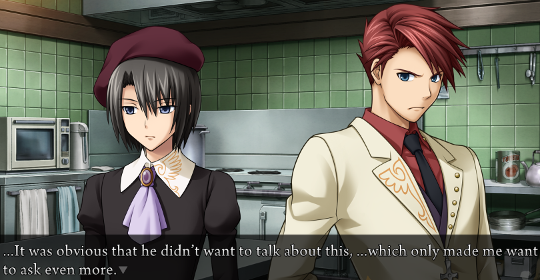
Battler gets his pushy jerk RPG protagonist hat on. He starts physically threatening Kanon.
Genji declares Beatrice is a real person, who did indeed give Kinzo the vast quantity of gold. Then Kumasawa drops a bigger reveal: Beatrice is a formless entity, though she was once a human who appeared as in the portrait. She can reveal herself as butterflies, but her default state is invisible.
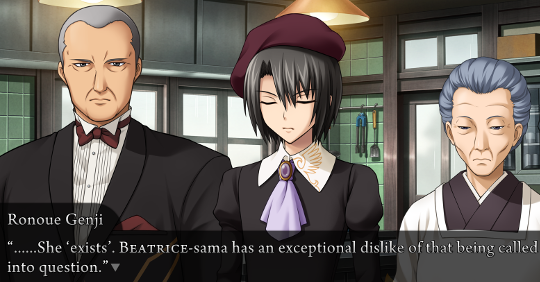
The quotation marks are an odd touch here. I wonder what they mean?
Battler presses square to doubt, and who should turn up but Maria, ready to drop some more occult knowledge? She claims Battler can’t see Beatrice because his ‘wavelength’, set at birth, is wrong.
It’s time for the…… Beatrice fact sheet!
- age: 1000 years
- demons commanded: all of them
- philosophers stone: alchemised
- gold: alchemised
- under contract: not for much longer
Maria says Battler was born without a trace of the sixth sense. And Beatrice, apparently, is right there in the room with them all, but he can’t tell.
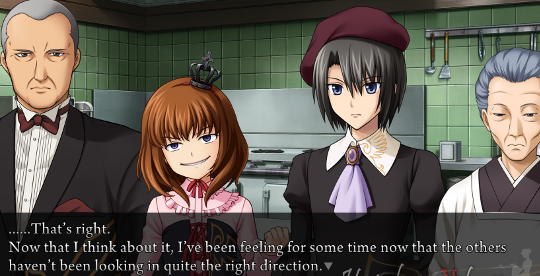
*panto voice* SHE’S BEHIND YOU!
Maria seems to have become a totally different person since the scene with the Seal of Solomon. She needles Battler, constantly doing the evil laugh. She claims her charm is the only reason he wasn’t sacrificed.
Battler’s Rationality Music (called Core in the soundtrack) kicks in. He reveals he no longer has the charm on his person.
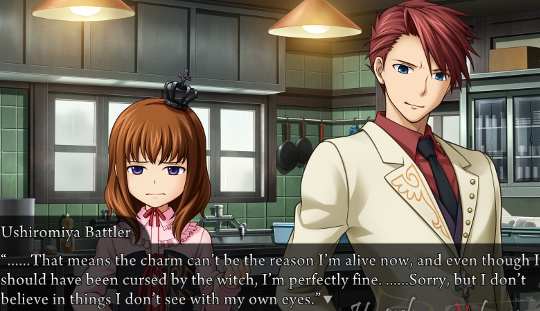
Ignoring ‘things [you] don’t see with my own eyes’ would rule out most of knowledge y’know, Battler. Inference and modelling is a thing, and I know you do it. Does the world cease to be every time you close your eyes?
Anyway, Battler argues epistemology with a nine-year-old. He accuses her and the three servants of trying to induct him into a cult. Maria basically retorts oh, you’ll see: once Beatrice resurrects, even out-of-phase people like Battler will be able to see her.
Comments